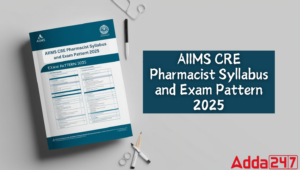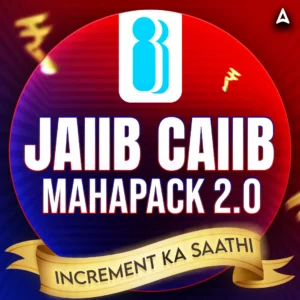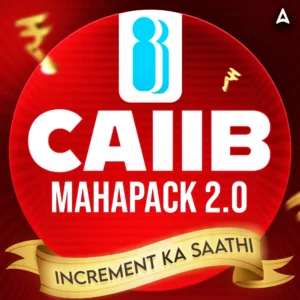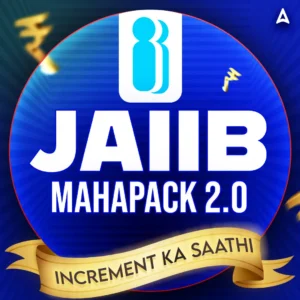The Indian Institute of Banking and Finance (IIBF) conducts the CAIIB Exam 2026 twice a year to support banking professionals in advancing their careers. The exam evaluates candidates’ knowledge of banking and financial management, regulations and laws, risk management, and related areas.
The CAIIB exam consists of a total of five papers, including four compulsory papers and one elective paper. To qualify each paper, candidates must score at least 50 out of 100 marks. Read on for detailed information about the CAIIB exam pattern, mode of examination, paper-wise structure, and qualifying marks.
CAIIB Exam Pattern 2026
IIBF CAIIB 2026 Exam will take place in June-July 2026, and it is important to have a qualified JAIIB to appear for it. The candidate must be aware of the CAIIB Paper Pattern and Syllabus, as without it, cracking the exam is not possible. So, for a clear understanding, we have discussed the exam pattern and some important aspects of it.
CAIIB Registration 2026 – Click to Apply
CAIIB Papers 2026
There are 4 compulsory papers and 1 Elective paper (out of 5 subjects, candidates can choose one). The name of the CAIIB Papers is as follows:
| CAIIB Papers 2026 | |
| Paper Type | Paper Name |
| Compulsory Paper |
|
| Elective Paper |
|
CAIIB Exam Pattern 2026: Marks and Duration
Each paper in CAIIB Exam consists of 100 questions of 1 mark each and total duration of each paper is 2 hours. There is no negative marking for both unanswered and incorrect answers. The question are asked in the multiple choice based pattern. All 5 papers will be conducted on 5 different days and it is mandatory to appear for all.
| CAIIB Exam Pattern 2026 | ||||
| Paper | Subjects | No. of Questions | Marks | Duration |
| I | Advanced Bank Management(ABM) | 100 | 100 | 2 hour |
| II | Bank Financial Management (BFM) | 100 | 100 | 2 hour |
| III | Advanced Business and Financial (ABFM) Management | 100 | 100 | 2 hour |
| IV | Banking Regulations and Business Laws (BRBL) | 100 | 100 | 2 hour |
| V | Elective Paper (Any One) | 100 | 100 | 2 hour |
CAIIB Papers: Qualifying Marks & Passing Criteria
To successfully clear the CAIIB (Certified Associate of Indian Institute of Bankers) examination, candidates must fulfill the following qualifying criteria:
Minimum Qualifying Marks:
- Pass Marks (Per Subject): A minimum of 50 out of 100 marks is required in each subject.
- Aggregate Passing (Single Attempt): If a candidate scores at least 45 marks in each subject and achieves an overall aggregate of 50%, they will be considered to have passed the exam in that single attempt.
- Credit Retention: Candidates who pass one or more papers can retain credits for the passed subjects until the examination’s validity period expires.
CAIIB Class of Pass (2026)
The Class of Pass is awarded based on overall performance and attempt status:
First Class: To be awarded First Class, the following conditions must be met:
Aggregate Score: 60% or above across all subjects. All papers must be passed in the first physical attempt.
First Class with Distinction: This is the highest honor in the CAIIB examination. To earn a First Class with Distinction, candidates must:
- Achieve a 70% or higher aggregate score across all subjects.
- Score at least 60% in each subject individually.
- Pass all subjects in the first physical attempt.
CAIIB Paper-wise Modules To Be Covered
The paper-wise modules to be covered is given below. For more details about topics, you can check CAIIB Syllabus 2026.
|
CAIIB Paper-wise Modules Name (Compulsory Paper)
|
|
| Paper |
Module Names
|
| Paper 1: Advanced Bank Management (ABM) |
– Module A: Statistics
– Module B: Human Resource Management – Module C: Credit Management – Module D: Compliance in Banks & Corporate Governance |
| Paper 2: Bank Financial Management (BFM) |
– Module A: International Banking
– Module B: Risk Management – Module C: Treasury Management – Module D: Balance Sheet Management |
| Paper 3: Advanced Business & Financial Management (ABFM) |
– Module A: The Management Process
– Module B: Advanced Concepts of Financial Management – Module C: Valuations, Mergers, & Acquisitions – Module D: Emerging Business Solutions |
| Paper 4: Banking Regulations and Business Laws (BRBL) |
– Module A: Regulations and Compliance
– Module B: Important Acts/Laws & Legal Aspects of Banking Operations (Part A) – Module C: Important Acts/Laws & Legal Aspects of Banking Operations (Part B) – Module D: Commercial & Other Laws with Reference to Banking Operations |
|
Elective Papers
|
|
| Elective Paper |
Modules Name
|
| Paper 1: Rural Banking |
– Module A: Rural India
– Module B: Financing Rural Development – Module C: Priority Sector Financing & Govt. Initiatives – Module D: Problems & Prospects in Rural Banking |
| Paper 2: Human Resources Management |
– Module A: Human Resource Management
– Module B: Building an HR Strategy – Module C: Motivation, Training, and Skill Development – Module D: Personnel Management and Industrial Relations – Module E: Emerging Scenario in HRM |
| Paper 3: Information Technology & Digital Banking |
– Module A: Information Technology & Digital Banking
– Module B: Systems & Design – Module C: Banking Technology Applications & Digital Banking – Module D: Information System Security Controls & Audit |
| Paper 4: Risk Management |
– Module A: Risk & Risk Management Framework
– Module B: Credit Risk – Module C: Market Risk – Module D: Operational Risk – Module E: Basel & RBI Guidelines on Risk Management – Module F: Derivatives & Risk Management |
| Paper 5: Central Banking |
– Module A: Rationale & Functions of Central Bank
– Module B: Central Banking in India – Module C: Monetary & Credit Policies – Module D: Management of Foreign Exchange Reserves & Constituents of Indian Financial Market – Module E: Regulation, Supervision, and Financial Stability – Module F: Non-Banking Financial Companies & Primary Dealers |



 ASRB NET Vegetable Science Syllabus 2026...
ASRB NET Vegetable Science Syllabus 2026...
 ASRB NET Genetics and Plant Breeding Syl...
ASRB NET Genetics and Plant Breeding Syl...
 AIIMS CRE Pharmacist Syllabus and Exam P...
AIIMS CRE Pharmacist Syllabus and Exam P...



 Adda247 Job portal has complete information about all Sarkari Jobs and Naukri Alerts, its latest recruitment notifications, from all state and national level jobs and their updates.
Adda247 Job portal has complete information about all Sarkari Jobs and Naukri Alerts, its latest recruitment notifications, from all state and national level jobs and their updates.




